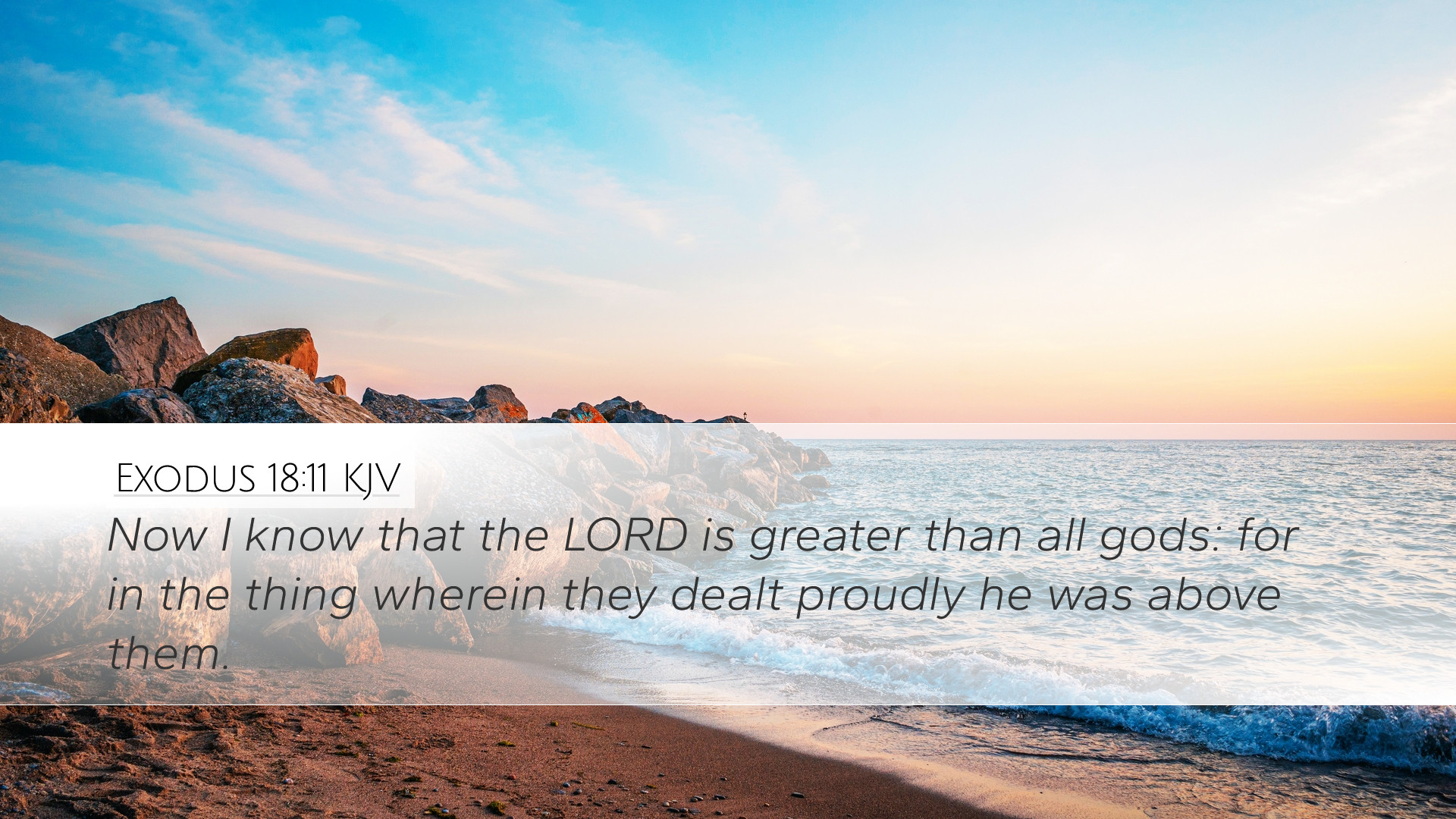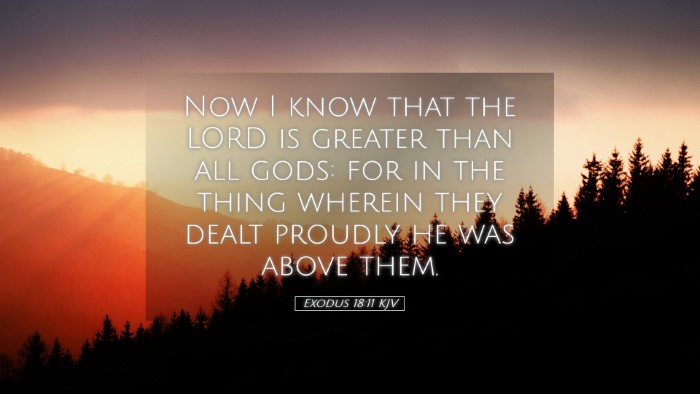Exodus 18:11 Commentary
Verse: "Now I know that the Lord is greater than all gods: for in the thing wherein they dealt proudly he was above them." (Exodus 18:11)
Contextual Overview
The verse in Exodus 18:11 comes amid a significant narrative where Jethro, Moses’ father-in-law, provides counsel to Moses after he witnesses the burdens Moses carries as the leader of the Israelites. This chapter accentuates the themes of wisdom, leadership, and divine sovereignty.
Insights from Matthew Henry
Matthew Henry emphasizes the transformation in Jethro's understanding of God. Jethro acknowledges the supremacy of the Lord over all gods, contrasting the pride of other deities with God's unrivaled authority. Henry notes that this acknowledgment is not merely theoretical but is a conclusion drawn from Jethro's observation of God’s deliverance of Israel and His mighty deeds.
- Recognition of God’s greatness: Jethro's proclamation illustrates a key theological tenet: the greatness of God surpasses all earthly powers and idols.
- Personal experience: Henry argues that Jethro's insights stem from witnessing the divine intervention in Israel's escape from Egypt. His firsthand experience of God's power informs his theological stance.
Insights from Albert Barnes
Albert Barnes expounds on the implications of Jethro’s declaration. He notes this realization marks a critical moment in the narrative's development, where Jethro transitions from a priest of Midian to a believer in the one true God. Barnes underscores the importance of acknowledging God's supremacy as a foundation for proper worship and reverence.
- Idolatry contrasted: Barnes highlights that Jethro's statement serves as a critique of surrounding idolatrous practices, reminding readers that all who come against God are ultimately humbled.
- Faith application: This acknowledgment not only solidifies Jethro’s faith journey but also serves as an example for followers to recognize and testify to God's greatness in their lives.
Insights from Adam Clarke
Adam Clarke delves into the linguistic and cultural context surrounding Jethro's declaration. He analyses the term "gods" in the passage, suggesting that it refers to the myriad deities worshipped by the surrounding nations. Clarke asserts that Jethro’s statement reflects a pivotal shift in understanding, emphasizing the importance of recognizing God’s authority in a pluralistic society.
- Understanding pride: Clarke notes the significance of the word “proudly,” pointing to the arrogance of those who challenge God's supremacy. This highlights a recurring biblical theme where God often uses the proud for His greater purpose.
- Encouragement for believers: Clarke encourages believers to hold fast to their faith in the face of competing beliefs, reminding them of God's overarching sovereignty and ability to deliver.
Theological Implications
This verse does not merely serve as a historical account, it presents profound theological implications for contemporary believers. The acknowledgment of God’s supremacy invites reflection on several key themes:
- Sovereignty of God: The declaration affirms God's ultimate authority over creation and human affairs, a comforting truth for believers in times of turmoil.
- Faith and testimony: Jethro's recognition encourages modern believers to share their experiences of God's faithfulness, reinforcing the powerful role of personal testimony in the community.
- Worship's rightful focus: It calls the faithful to examine their worship practices, ensuring they align with the acknowledgment of God's supremacy rather than the distractions of worldly idols.
Practical Applications for Pastors and Theologians
For pastors and theologians, the exegesis of Exodus 18:11 offers valuable insights for teaching and spiritual formation:
- Preaching on Divine Authority: Sermons could focus on the concept of God’s greater authority in contrast to worldly powers, encouraging congregations to trust in God’s judgment and timing.
- Encouraging Faith in Adversity: Pastoral care can utilize Jethro's journey as a framework for helping individuals recognize and affirm God’s sovereignty amid life’s challenges.
- Building Communities of Witness: The emphasis on testimony invites the church community to create spaces where believers can share their encounters with God, reinforcing collective faith.
Conclusion
Exodus 18:11 stands as a powerful declaration of God’s greatness, encouraging believers to embrace His sovereignty. The insights drawn from Matthew Henry, Albert Barnes, and Adam Clarke weave a rich tapestry of understanding that invites deeper reflection and application. As church leaders engage with this text, they are reminded of the importance of proclaiming God's unparalleled greatness, fostering faith, and encouraging a community grounded in witness and worship. This verse continues to resonate with profound meaning in the life of the Church today.


